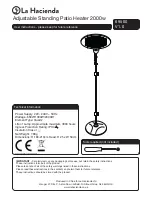
Page 12
SECTION V: MAINTENANCE
WaTer pIpIng
On an annual basis, all piping should be checked for leakage at joints, shut-off valves, and
unions.
T&p relIef valve
On an annual basis, the temperature and pressure relief valve should be checked for proper
operation. First, attach a drain line to the valve to direct the water discharge to an open drain.
This is very important because the temperature of the discharge could be very hot. Second, lift
the lever at the end of the valve several times. The valve should operate freely and return to its
original position properly. If water does not flow out of the valve, remove and inspect for
corrosion or obstructions. Replace with a new valve if necessary. Do not repair the faulty valve
as this may cause improper operation.
anode rods
Anode rods should be inspected twice in the first year and at least yearly once a time interval for
inspection has been developed. It is recommended to check the rod(s) six months after the
heater is installed. If the anode rod had reduced in size by two-thirds of its original diameter of
3/4” or shows signs of pitting, it is time for replacement. Take the following steps when changing
the anode rod(s):
1. Shut off water supply.
2. Open any faucet to relieve tank pressure.
3. Remove caps on indirect water heater top; push insulation aside.
4. Use a 1 1/16” six-sided socket wrench and a breaker bar. Snap hard to break the anode
rod seal.
5. Remove rod(s) and replace with new rod(s).
6. Turn water supply back on and leave faucet open until air is out of line.
7. Turn faucet off and check that new rod(s) doesn’t leak.
8. Snap caps back into place.
flusH THe Tank
The indirect water heater is glass lined. Elements in the water such as lime, iron and other
minerals may accumulate in the heater. It is recommended that the tank be drained and flushed
thoroughly once a year to prevent buildup in the tank.


































